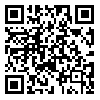Volume 14, Issue 4 (Oct & Nov 2020)
payavard 2020, 14(4): 311-332 |
Back to browse issues page
Download citation:
BibTeX | RIS | EndNote | Medlars | ProCite | Reference Manager | RefWorks
Send citation to:



BibTeX | RIS | EndNote | Medlars | ProCite | Reference Manager | RefWorks
Send citation to:
Mosadeghrad A M, Ghazanfari F. Iran hospital accreditation governance: Challenges and solutions. payavard 2020; 14 (4) :311-332
URL: http://payavard.tums.ac.ir/article-1-7042-en.html
URL: http://payavard.tums.ac.ir/article-1-7042-en.html
1- Associate Professor, Department of Health Management and Economics, Tehran University of Medical Sciences, Tehran, Iran
2- Ph.D. Candidate in Health Care Management, Tehran University of Medical Sciences, Tehran, Iran ,maha5065@yahoo.com
2- Ph.D. Candidate in Health Care Management, Tehran University of Medical Sciences, Tehran, Iran ,
Abstract: (2923 Views)
Background and Aim: Hospital accreditation is “an external evaluation of a hospital’s structures, processes, outputs and outcomes by an independent professional accreditation body using pre-established optimum standards”. Accreditation is a strategy for ensuring the quality and, safety of hospital services. An accreditation program’s efficacy depends on the validity of its governance, methods, standards, and surveyors. The Iranian hospital accreditation program faces some challenges. This study aimed to identify the governance challenges of the Iranian hospital accreditation program and its solutions.
Materials and Methods: This qualitative study was performed using semi-structured interviews in 2019. Using a pluralistic evaluation approach, 151 policy makers, accreditation surveyors, hospital managers and staffs, and academics from the ministry of health, medical universities, hospitals and health insurance companies were purposively recuited and interviewed. Thematic analysis was used fordata analysis.
Results: Overall, 23 governance challenges were identified and were grouped into seven categories, i.e., organizational structure, organizational communication, policy making, planning, financing, stewardship and evalutation. Lack of independence, inappropriate organizational structure, resource shortage, senior managers’ mobility and turnover, weak internal and external communication, a compulsory accreditation program, insufficient knowledge of hospital accreditation, and lack of evaluation of the hospital accreditation were the main challenges. Establishing an accreditation council with four idependent scientific, accreditation, appeal and performance evaluation committes, piloting the accreditation program, proper planning, cascade education and training, allocating a specific budet for hospital accreditation, getting the ISQua accreditation certificate and public announcement of hospitals’ accreditation results were proposed as solutions to these challenges.
Conclusion: The governance of Iran's hospital accreditation program faces serious challenges. Improving the governance of the accreditation program leads to achieving the desired results.
Materials and Methods: This qualitative study was performed using semi-structured interviews in 2019. Using a pluralistic evaluation approach, 151 policy makers, accreditation surveyors, hospital managers and staffs, and academics from the ministry of health, medical universities, hospitals and health insurance companies were purposively recuited and interviewed. Thematic analysis was used fordata analysis.
Results: Overall, 23 governance challenges were identified and were grouped into seven categories, i.e., organizational structure, organizational communication, policy making, planning, financing, stewardship and evalutation. Lack of independence, inappropriate organizational structure, resource shortage, senior managers’ mobility and turnover, weak internal and external communication, a compulsory accreditation program, insufficient knowledge of hospital accreditation, and lack of evaluation of the hospital accreditation were the main challenges. Establishing an accreditation council with four idependent scientific, accreditation, appeal and performance evaluation committes, piloting the accreditation program, proper planning, cascade education and training, allocating a specific budet for hospital accreditation, getting the ISQua accreditation certificate and public announcement of hospitals’ accreditation results were proposed as solutions to these challenges.
Conclusion: The governance of Iran's hospital accreditation program faces serious challenges. Improving the governance of the accreditation program leads to achieving the desired results.
Send email to the article author
| Rights and permissions | |
 |
This work is licensed under a Creative Commons Attribution-NonCommercial 4.0 International License. |





